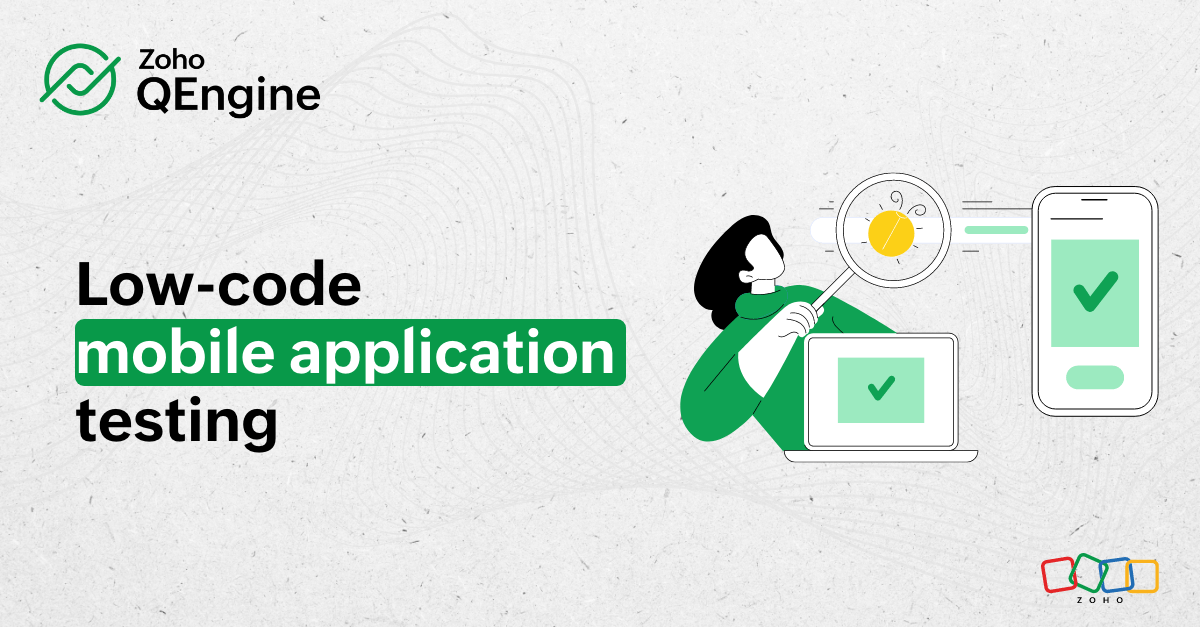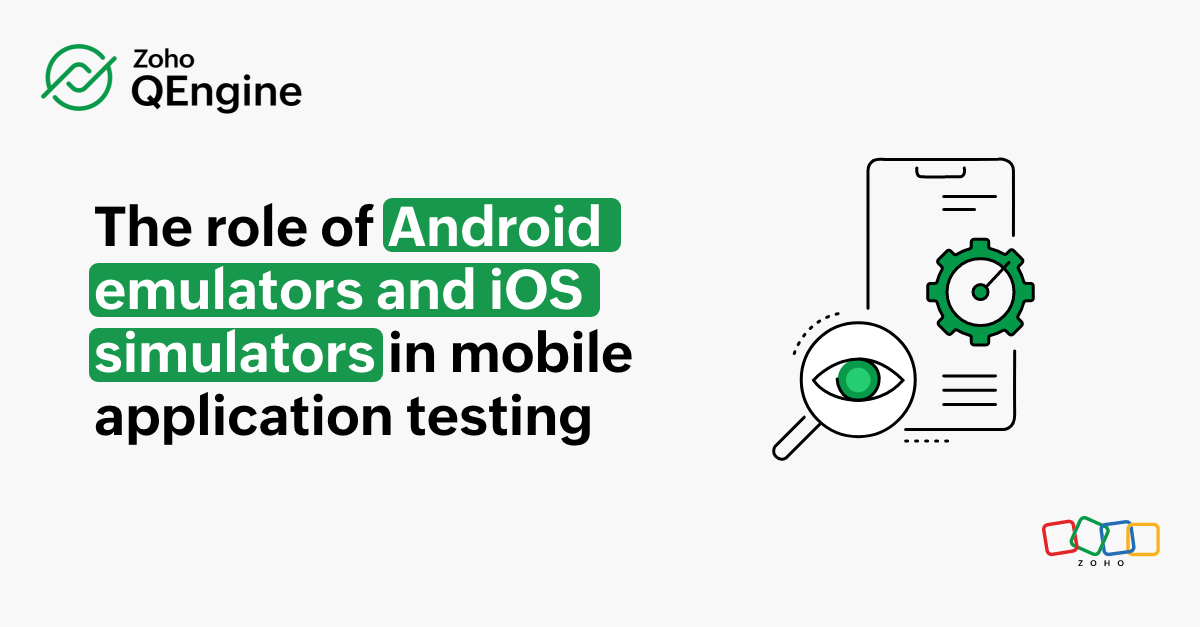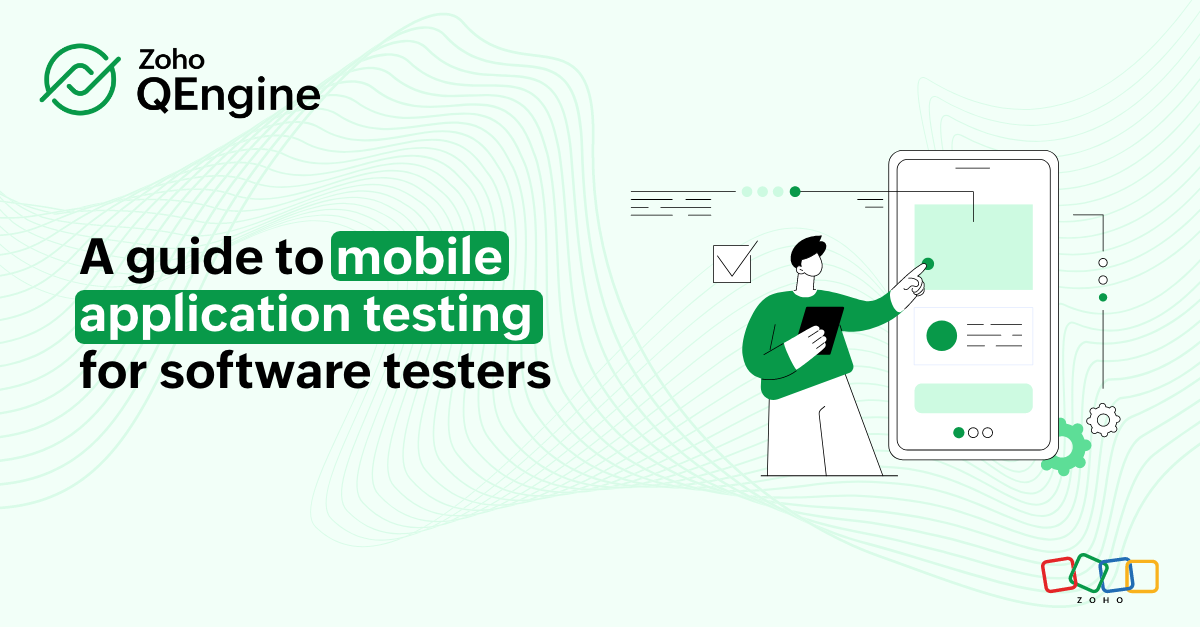- HOME
- Mobile testing
- Low-code mobile application testing
Low-code mobile application testing
- Last Updated : July 30, 2024
- 118 Views
- 5 Min Read

The smartphone era is a significant milestone in digital transformation, with the global mobile app market volume estimated to reach $673B by 2027. Consumer spending on mobile devices has risen drastically, and the average smartphone user now spends 4-5 hours a day hooked to their mobile apps. In order to keep up with this trend and continue building sophisticated mobile apps for customers, extensive mobile application testing is necessary. Functional testing, performance testing, security testing, load testing, usability testing, and more is a necessity if you plan to build robust mobile applications.
This is where low-code test automation tools, like Zoho QEngine, come in.
What is low-code test automation?
Testing mobile apps is vital to releasing quality applications—but with frequent releases, repetitive testing can be a challenge. Low-code mobile app testing removes the need for testers to write scripts manually, improving test coverage. Automation testing also requires limited coding knowledge and can be easily adopted by testers with any level of technical expertise. Picking a test automation tool that supports multiple operating system versions, mobile browsers, and device configurations, and provides a seamless user experience is key to building and maintaining modern Android and iOS apps. This helps shift the focus from low-priority repetitive tests to high-priority edge cases that require manual intervention.
Functional testing, security testing, performance testing, and usability testing are cornerstones of mobile testing automation. Low-code test automation is also an integral part of agile projects and enables CI/CD integration, higher release velocity, improved coverage, and effective team collaboration.
How is low-code testing beneficial for mobile app testing?
Test case creation
Test case creation can be seamlessly done with automated testing tools like QEngine, that have mobile test automation frameworks in place. QEngine also has prebuilt tasks and prompts, exclusively built for various operating systems, to help testers write test cases quickly and effectively.
Record and playback
Record and playback, a popular feature in automated testing, captures user actions and automatically creates corresponding test cases. Testers can then add code syntax to check for business logic and various test scenarios. It saves time and improves efficiency.
Self-healing AI
The self-healing AI automatically picks up broken locators and suggests fixes. This saves a lot of effort for testers, ensuring that dynamic elements, such as locators, remain updated with new changes, so they don't need to scrutinize the code to check for errors and then fix them.
Test management
Zoho QEngine is a test automation tool with an integrated test case management component that eases testing. You can collate or segregate test cases into modules, based on their functionalities. Specifically for mobile app testing, creating and managing numerous test cases for multiple operating systems can be done in a single project window. With Zoho QEngine, test case management is a piece of cake.
Test reporting
Manual test reporting can be both time-consuming and cumbersome. QEngine has extensive built-in analytics dashboards that automatically convert the test data into actionable insights. These insights can be pushed to different project management software, allowing development teams to efficiently manage testing new features or streamline the development lifecycle.
Test execution
In a traditional setup, mobile app testing requires real mobile devices. Device fragmentation, procurement of so many devices, and network issues are some of the challenges faced by testers. However, in a mobile app testing tool like QEngine, a solid mobile test automation framework eases this process. Tests can be executed on the cloud, on local machines, or using a hybrid of both, via tunnelling, for multiple operating systems. QEngine's simulators and emulators enable mobile app testing in near-real environments and improve test coverage, without the need for physical mobile devices.
Deployment
Once you create your test cases, they can be easily deployed to the production environment with a single click, saving a lot of time and effort.
How to pick the right automated testing tool for mobile apps
Ease of use
Open source tools require installation of various components separately. However, a comprehensive test automation tool like QEngine has the components prebuilt and ready to use.
Mobile-specific testing tasks
Low-code test automation platforms like Zoho QEngine provide flexibility for testers to use mobile-app-specific prompts and prebuilt tasks and then customize them as per their requirements. Check for mobile-specific testing tasks, cross-device execution, reporting, and other crucial features you may require.
Low-code and no-code features
A low-code software testing tool—in addition to low-code functionalities—should enable scriptless testing. With a tool like Zoho QEngine, testers can toggle between the record-and-playback and drag-and-drop functionalities to write test cases more efficiently.
Third-party integrations
Test automation tools should enable integrations with third-party tools, project management tools, collaboration tools and external frameworks, to enable easy cross-functional team collaboration.
How to get your team onboard
As businesses are constantly evolving to align with market trends, they upgrade their tech stack to reduce IT backlog and improve return on investment. A low-code test automation tool is not just a "good-to-have" but a "must-have" for any enterprise that deals with mobile apps—but getting your team to adopt new software can be tricky.
Choosing the right tool is key. Identify the bottlenecks in your QA process and pick an end-to-end test automation solution that can ease all your pain points. Using multiple tools only complicates the process further.
Effective team collaboration can ensure that the development and QA teams aren't working in silos. This is why it's important to pick a tool that both teams can utilize, saving both time and money.
Unfortunately, it's impossible to escape the digital innovation rat race. But once you reach the pinnacle of your tech-stack maturation journey, you'll see the results in your company's bottom line and state-of-the-art mobile apps.
Zoho QEngine
Zoho QEngine is a one-stop-shop for web testing, mobile app testing, and API testing. It's built on a Selenium-based framework and supports both Android and iOS mobile testing to bug-proof all your mobile apps. It's a unified test automation tool that empowers you to build quality mobile applications in no time.
Feature highlights:
Record-and-playback, drag-and-drop, and keyword prompts for effective test case creation
AI-based self-healing functionality
Advanced dashboard capabilities provide actionable insights to plan future tests accordingly
Test web apps, native apps, and hybrid apps
Test execution on cloud and local environments
Effective logging of mobile-app-specific test cases for future reference
Built-in collaboration tools and role hierarchies for cross-functional teams to improve efficiency
Integrations with third-party tools and frameworks
Help guides, free webinars, exclusive training, and a personalized demo









